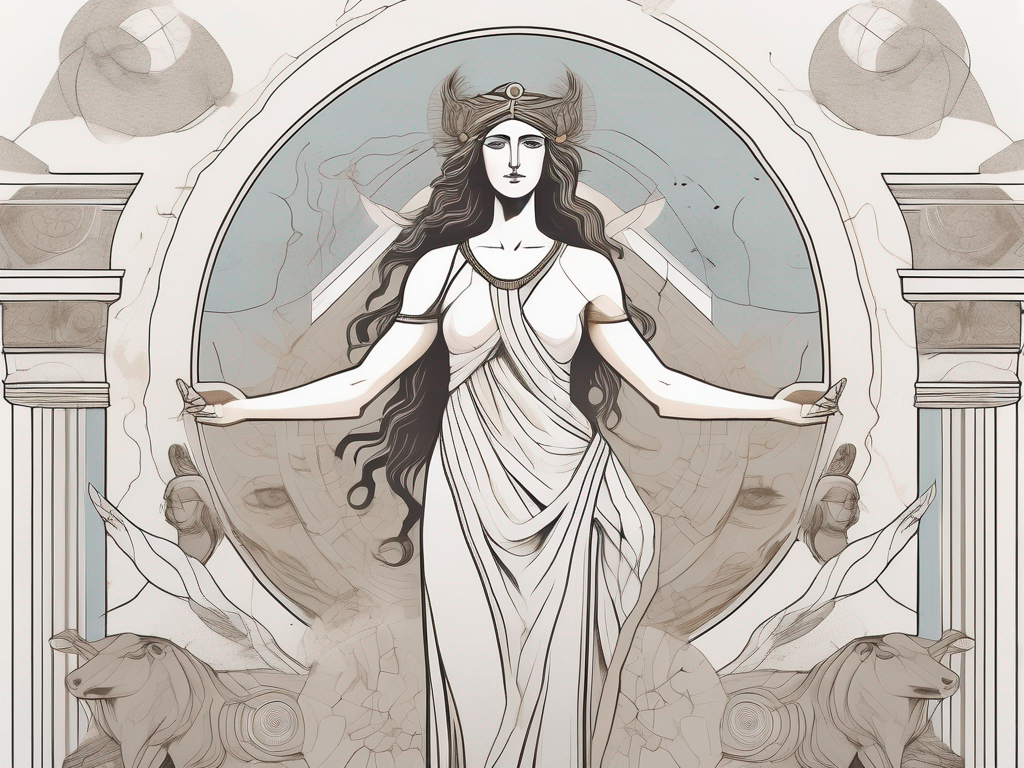If you’ve ever delved into Greek mythology, you might have come across the enigmatic goddess Apate. Known as the goddess of deception and trickery, Apate remains a mesmerizing figure in ancient folklore. In this article, we’ll peel back the layers of mystery and explore the fascinating role she played in Greek mythology, her symbolism, the mythological tales surrounding her, the worship and cult dedicated to her, and even her influence on modern culture and media.
Understanding the Role of Apate in Greek Mythology
To truly grasp Apate’s significance, we must first examine her place in the pantheon of Greek deities. While not as widely recognized as Zeus or Athena, Apate holds a unique and influential position. She is the daughter of the primordial gods Nyx (night) and Erebus (darkness), making her a deity of immense power and mystery.
Apate’s domain lies in the realm of deception, illusion, and dishonesty. Unlike some of the more revered gods and goddesses, Apate’s role was not to uphold justice or protect mortals. Instead, she thrived on cunning and deceit, using her powers to manipulate situations and people to her advantage.
In Greek mythology, Apate was often depicted as a beautiful and alluring goddess. She possessed an enchanting voice that could sway even the most steadfast individuals. Her silver tongue and beguiling charm made her a formidable force to be reckoned with. Apate was known to appear in various forms, assuming different guises to deceive and mislead those who crossed her path.
One of the most famous tales involving Apate is the story of Prometheus. As the titan who stole fire from the gods and gave it to humanity, Prometheus became a symbol of rebellion and defiance. However, it was Apate who played a crucial role in his downfall. She disguised herself as a trusted ally, gaining Prometheus’ trust and ultimately betraying him to the mighty Zeus.
Apate’s influence extended beyond individual mortals and impacted the very fabric of Greek society. In a culture that valued honor and integrity, her presence served as a reminder of the darker aspects of human nature. Apate’s ability to sow discord and mistrust among even the closest of friends was a constant threat, challenging the bonds of loyalty and camaraderie.
Despite her reputation for deceit, Apate was not without her own vulnerabilities. Like all gods and goddesses, she too had her weaknesses. It was said that Apate’s powers were weakened in the presence of truth and sincerity. Honesty acted as a shield against her manipulations, making it crucial for mortals to remain steadfast in their convictions and resist her temptations.
Apate’s role in Greek mythology serves as a cautionary tale, reminding us of the dangers of deception and the importance of remaining true to oneself. Her presence in the pantheon of gods and goddesses is a testament to the complexity of human nature and the eternal struggle between truth and illusion.
The Symbolism Associated with Apate
The symbols associated with Apate lend insight into the nature of her powers. Deception and illusion are at the core of Apate’s symbolism. She represents the veils we often put on and the lies we tell ourselves or others. Apate’s influence can be seen in various forms of art and literature, where the idea of trickery and manipulation takes center stage.
Apate, the Greek goddess of deceit, has long fascinated artists and writers throughout history. Her enigmatic nature and the symbolism she embodies have inspired countless creative works, each exploring the depths of human duplicity and the art of deception.
One of the most prominent mediums through which Apate’s symbolism is expressed is painting. Artists have skillfully captured the essence of her deceptive powers by depicting hidden motives and secret agendas in their artwork. The brushstrokes themselves seem to weave a web of illusion, inviting viewers to question the authenticity of what they see. In these paintings, Apate’s presence is palpable, reminding us of the fragile line between reality and falsehood.
Similarly, literature has been deeply influenced by Apate’s symbolism. Countless novels and stories delve into the intricacies of human duplicity, exploring the themes of deception, manipulation, and the consequences of living a life built on lies. These literary works serve as cautionary tales, urging readers to question the motives of others and to be aware of the masks people wear.
Apate’s symbols, such as the mask and the labyrinth, serve as powerful reminders of the deceptive nature of the world. The mask, a symbol often associated with theater, represents the various roles we play in our lives and the facades we present to the world. It reminds us that what we see on the surface may not always reflect the truth that lies beneath.
The labyrinth, another symbol frequently linked to Apate, represents the intricate maze of deception and confusion that we navigate in our daily lives. Just as Theseus had to find his way through the labyrinth to defeat the Minotaur, we too must navigate the twists and turns of deceit to uncover the truth. The labyrinth serves as a metaphor for the challenges we face in distinguishing reality from illusion.
Apate’s influence extends beyond the realm of art and literature. Her symbols can be found in everyday life, reminding us to question the narratives we encounter and to look beyond the surface. In a world where misinformation and manipulation are prevalent, Apate’s symbolism serves as a constant reminder to seek truth and to be wary of the illusions that surround us.
The Mythological Tales of Apate
Apate, the goddess of deceit and deception, holds a prominent place in ancient Greek literature, weaving her intricate web of manipulation throughout various mythological tales. Her influence is far-reaching, leaving a lasting impact on the lives of both mortals and gods alike.
One of the most infamous stories involving Apate is the tale of Pandora’s Box. In this myth, Zeus, the king of the gods, entrusted Pandora with a mysterious box that contained all the sorrows and miseries of the world. Warned not to open it under any circumstances, Pandora found herself unable to resist the tantalizing whispers of Apate. The goddess of deceit played upon Pandora’s curiosity, slowly eroding her resolve until she could no longer resist the temptation. With trembling hands, Pandora opened the box, unleashing a torrent of darkness upon the unsuspecting world. The release of these evils forever changed the course of human history, marking Apate’s malevolent influence on the mortal realm.
But Apate’s treachery did not end there. She also played a significant role in the epic tale of the Trojan War, a conflict that would shape the destiny of nations. Disguising herself as the goddess Artemis, Apate appeared before the Trojan prince Paris, who was tasked with judging a beauty contest between three powerful goddesses: Aphrodite, Hera, and Athena. With her silver tongue and beguiling charm, Apate convinced Paris to award the golden apple, a symbol of beauty and power, to Aphrodite. In return, Aphrodite promised Paris the love of the most beautiful woman in the world, Helen, who happened to be the wife of Menelaus, the king of Sparta.
Blinded by desire and under the spell of Apate’s enchantment, Paris succumbed to temptation and abducted Helen, setting in motion a chain of events that would lead to the legendary Trojan War. Apate’s cunning manipulation had successfully sown the seeds of discord and betrayal, pitting the Greeks against the Trojans in a bloody conflict that would span a decade.
Throughout these mythological tales, Apate’s presence is a constant reminder of the destructive power of deception. Her ability to exploit the weaknesses and vulnerabilities of others serves as a cautionary tale, warning mortals and gods alike of the dangers that lie in succumbing to her deceitful whispers. The stories of Pandora’s Box and the Trojan War stand as timeless reminders of the consequences that befall those who fall under Apate’s spell, forever etching her name in the annals of Greek mythology.
The Worship and Cult of Apate
Despite her controversial nature, Apate had a dedicated cult of worshippers. These followers engaged in rituals and practices aimed at harnessing Apate’s powers of deception for their own gain. While the specifics of these rituals are largely lost to history, they undoubtedly involved acts of secrecy, manipulation, and cunning.
Temples dedicated to Apate existed in ancient Greece, serving as sacred sites where her cult worshippers gathered to pay homage. These temples stood as a testament to the power and significance of Apate in Greek society. Though much of Apate’s worship has been overshadowed by more widely revered gods and goddesses, her influence on the ancient Greek religious landscape cannot be ignored.
The Modern Interpretation of Apate
While we may no longer engage in traditional worship of Apate, her influence lives on in modern culture and media. The themes of deception and illusion associated with Apate find resonance in various forms of entertainment, such as books, movies, and television shows.
Furthermore, psychologists have explored the concept of deception from a psychological perspective, drawing upon Apate’s inherent traits. They delve into the ways in which people deceive themselves and others, shedding light on the complexities of human nature and motivation.
Apate may not be a household name like Zeus or Aphrodite, but her mythical presence continues to captivate our imaginations. Delving into her secrets invites us to confront the aspects of ourselves and the world that we may sometimes turn a blind eye to. So next time you encounter a tale of deception, remember the name Apate, the Greek goddess who resides in the shadows, pulling the strings of our perception and challenging us to see through the illusions that surround us.












